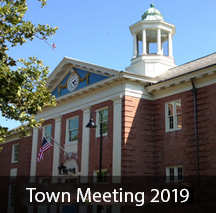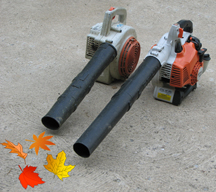 Here are some of the measures approved by residents at the March 23 Annual Town Meeting. See previous stories for coverage of the votes on the leaf blower bylaw and the deCordova/Trustees of Reservations integration.
Here are some of the measures approved by residents at the March 23 Annual Town Meeting. See previous stories for coverage of the votes on the leaf blower bylaw and the deCordova/Trustees of Reservations integration.
Town budget
Voters approved a FY 2020 budget of $41.55 million, a 10.3% increase from this year’s budget of $37.68 million. The total includes $4.29 million in debt service for the school building project and a 2.39% increase in the operating budget. Property taxes on the median-value house (assessed value of $998,400) will increase by about $1,781 or 12.7%. See pages 4 and 6 of the Annual Town Meeting Financial Section and Warrant for pie charts showing revenues and expenditures by category.
Capital and community preservation items
Voters approved the requests from the Capital Planning Committee and Community Preservation Committee (see the Lincoln Squirrel, March 14, 2019). Also approved in a separate vote was an appropriation of up to $400,000 for an irrigation systems for the Codman athletic field next to the pool. This will be the second irrigated field in town; the first is the new Wang field on Bedford Road set to open this spring (the town’s first new athletic field in 60 years).
The largest capital item was $600,000 for a new roof for the Hartwell school building. The roof was installed 31 years ago but was designed to last for only 20, and the Finance Committee recommended doing it this year “because we could fit in in budget and we are worried about long list of capital projects on the docket in coming years,” FinCom chair Jim Hutchinson said.
Recognitions
This year’s Bright Light Award went to Gary Davis, who was recognized for outstanding volunteerism. Davis, a retired architect, headed a project to digitize and create a searchable index of Planning and Department of Public Works documents, as well as updating the Planning Department filing system.
Tim Higgins was recognized for his 25 years of service as Town Administrator. His citation noted his “integrity, accessibility to the community, creative problem solving. tireless diplomacy, eternal optimism, endless patience and thoughtful leadership.”
“There are very few dull moments in Lincoln; we seem to move from one interesting and challenging project to another,” Higgins said in accepting the award, which included his very own parking spot at Town Hall. “If you’re a public policy nerd like I am and a history-oriented person, you can’t imagine a better place to spend your career.”
Departing Water Commission chair Packy Lawler and School Committee chair Tim Christenfeld were also thanked for their service.
Solar bylaw
Residents approved changes to new definitions for roof-mounted solar systems, energy storage systems and carport/canopy PV systems; financial and ownership arrangements to allow power purchase agreements; increased height limits for canopy-carport solar arrays; and adding a general waiver section. See section starting on page 11 of the list of motions (Article 28) for details.
State flag and seal
Residents voted to support creation of a state commission to study the idea of changing the Massachusetts state flag and seal, which some believe depicts oppression of Native Americans by English settlers.
“I would put to you that this is your version of the Confederate flag,” said Patricia Thornton Wells, who grew up in Georgia. “It has symbolism that means certain things to certain people that is very offensive. Most people in my town growing up didn’t take offense, but every African American does. I think this needs to be reconsidered from the context of all the people in our community.”
Noting that the motto on the flag and seal reads in part, “By this sword we seek peace,” resident Peter Pease said, “If that is not an aggressive statement… It seems so wrong to put people who owned this land before we came and have them on a flag… with a sword over their head. Please, let’s get this out of here.”
About a dozen residents voted nay, including Michael Coppock. He referred to the Native American on the flag, partly modeled on Metacomet, who led a rebellion known as King Philip’s War. “It was most deadly war in U.S. history as a percentage of population loss… he abandoned his father (Massasoit’s) of peace,” he said.
Other measures approved
- Authorization to bond $1.1 million for the Water Department
- Bylaw changes:
- Adding an exception for nonconforming lots that were reduced in size by an eminent-domain taking
- Adding two new properties to the Brown’s Wood Historic District
- Clarifying the definition of “demolition” under the demolition bylaw
- A ban on sales of e-cigarettes (a preemptive measure since no stores on Lincoln currently sell them). A handful of residents voted no.

 Following suggestions at a February 28 public forum, the
Following suggestions at a February 28 public forum, the